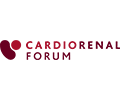Tag Archives: cardiorenal forum
February 2023 Br J Cardiol 2023;30:12–15
Cardiorenal medicine – new targets, treatments and technologies
Karin Pola, Sarah Birkhoelzer
| Full text
March 2018
News from the Cardiorenal Forum 12th Annual Scientific Meeting – Improving treatments in cardiorenal patients
Fazlullah Wardak and Rosie Kalsi
| Full textDecember 2017
Hyperkalaemia: who gets it, how frequent is it, what do I do and does it matter?
Professor David Wheeler, Dr Colin Doig
| Full text
March 2015 Br J Cardiol 2015;22:17
News from the Cardiorenal Forum 9th Annual Scientific Meeting – embracing the future, not forgetting the past
Dr Legate Philip
| Full text
December 2012 Br J Cardiol 2013;20:20–1 Online First


